Are there enough diagnostic labs for the potato industry in Canada?
Growing a potato crop isn’t easy. Whether it’s a commercial or seed crop, there’s a lot of variables involved. From fertilization, to hilling, to storage, to irrigation scheduling, there’s always something to keep you busy with.
And while there’s all the regular work you do, sometimes you find yourself looking at your crop asking, what is that? While you may do everything possible to grow a pest and disease-free crop, sometimes something will still slip in there and wreak havoc on your spuds. This is where diagnostic testing comes into play.
As a seed grower, diagnostic testing isn’t something you run to when you find a problem, instead it’s something you use pre-emptively so no problems arise. To make sure all the growers you sell seed to have clean, disease-free certified seed crops, you use diagnostic testing.
Diagnostic testing, according to a 2002 paper titled “Plant Disease Diagnosis” by Melissa B. Riley, Margaret R. Williamson, and Otis Maloy, is used for identification of biotic causal agents. The paper stated a major problem in the identification of biotic causal agents is the failure of some infectious pathogens to grow on artificial media, this is where viral identification through diagnostic testing is used to determine viruses.
“These types of reactions take specialized equipment and reagents, and the tests are not commonly done outside diagnostic and research laboratories,” the paper said.
Across Canada the potato industry annually uses diagnostic testing to keep everything flowing smoothly. Over the years, the industry has shifted from a public to private model for diagnostic testing causing some to question, just where do I go for testing services?
Transitioning from Federal Labs to Private
In the late 1990s change was afoot in Canada with new seed regulations on the way. New standard in the Canadian Seed Potato Certification Program were established in 1997 making for a larger volume of testing. The certification program supplies Canadian growers of seed, table stock and processing potatoes with certified seed of high varietal integrity relatively free of tuber borne diseases.
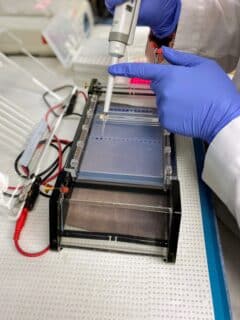
Before this the federal government had laboratories across the country that ran potato diagnostic testing, but the increased demand made the government change the testing system. At the time, Agriculture and Agri-Food Canada were running labs in locations in Prince Edward Island, New Brunswick, and Alberta. In some of those labs, the local potato industry stepped up and took over operations, switching them to being privately run facilities.
In New Brunswick, the diagnostic lab was transferred to the provincial department of agriculture and then to the New Brunswick Potato Agency, which is now called Potatoes New Brunswick. Agricultural Certification Services (ACS) is in Fredericton, N.B. with operations overseen by a board of directors made up of various people from the potato industry.
While some labs were moved from being public to privately run during the transition, others were founded following the change. Peter Ellis had been working for Agriculture Canada at the Vancouver Research Station in British Columbia analyzing potato viruses. As the government decreased testing services, Ellis was given a choice — he could stay on with the federal government and be moved to another location or take a buyout.
“I took the opportunity to take the buyout and start a lab primarily at the time for the seed growers in British Columbia,” Ellis explains in a phone interview. He founded Phyto Diagnostics Company Ltd. in North Saanich, B.C. in 1996.
These private labs are all approved under the Canadian Food Inspection Agency (CFIA) National Approval Program — they’re approved by the CFIA for regulatory inspection requirements. Currently there are five CFIA approved labs across Canada including Phyto Diagnostics, ACS, A&L Canada Laboratories Inc., P.E.I. Potato Quality Institute Inc. (PEIPQI), and Institut de recherche et de développement en agroenvironment.
Most of the privately run labs operate on a not-for-profit model with all operational costs being covered by the fees for testing services — they don’t receive funding from outside groups. Some operate with a board of directors while others are owned and operated independently.
The CFIA approved labs aren’t the only potato testing labs in Canada. Growers also have access to numerous provincial laboratories which cover a wide range of crops along with labs located at universities. There’s also the CFIA Charlottetown Laboratory which provides testing for the Potato Post-Entry Quarantine and oversight of the Seed Potato Certification programs, quarantine pest testing for potato cyst nematode and potato wart and oversees approval for private potato diagnostic labs.
Running a Diagnostic Lab for the Potato Industry
The labs provide a wealth of diagnostic services to the potato industry, especially for seed growers. While the labs have set regular tests they perform, such as for potato virus y (PVY), bacterial ring rot (BRR), potato mop top virus (PMTV), amongst many others, they also provide services based on demand.
“Depending on what industry requires, so we provide all the testing,” Mathuresh Singh, ACS director, says in a phone interview. “We provide two types of service; one is regulatory testing which is required by federal regulations. And there are some tests (that are) provincially required, like a post-harvest virus testing… and then nuclear audit we call tissue culture testing.”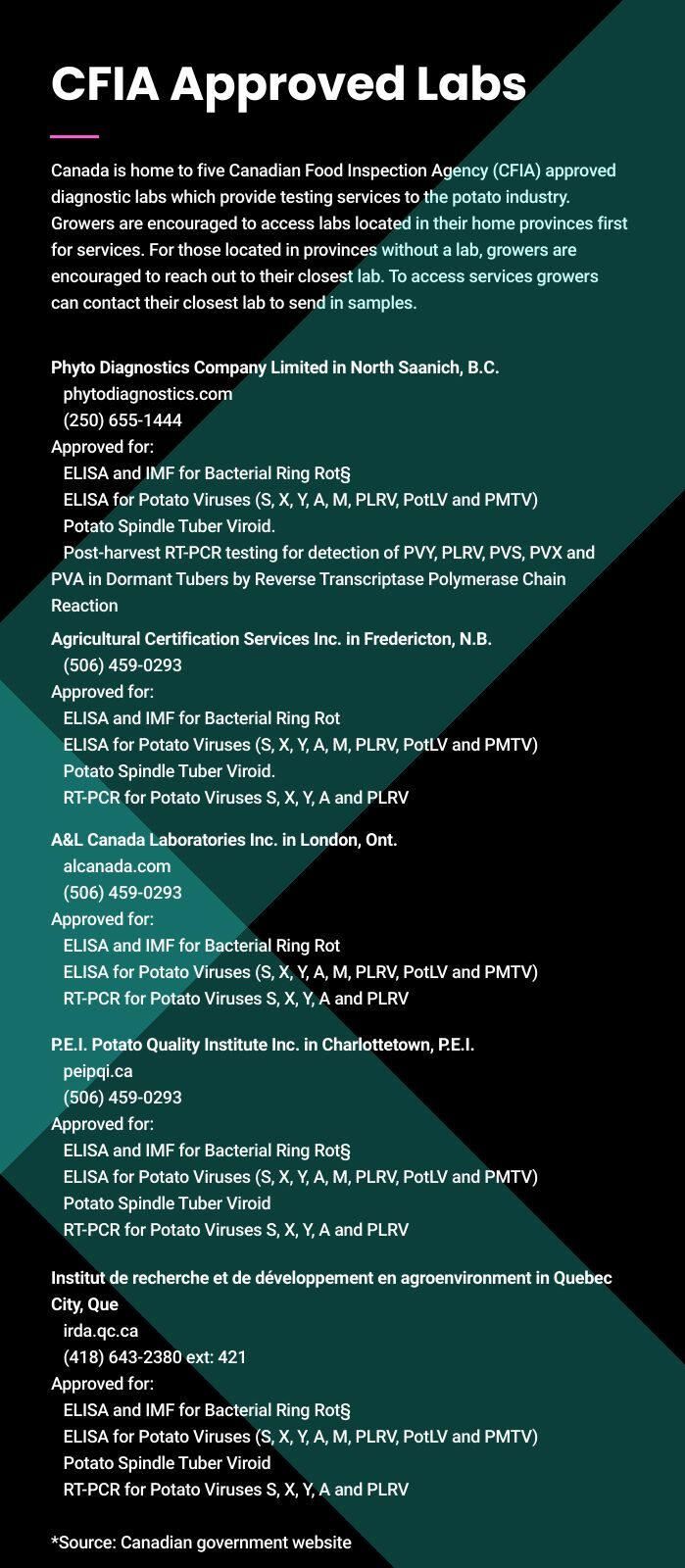
As ACS is a CFIA approved lab, they follow CFIA testing protocols. Most testing is done using enzyme-linked immunosorbent assay (ELISA) tests, Singh says. They also use polymerase chain reaction (PCR) and quantitative polymerase chain reaction (qPCR).
Turnaround time for receiving results varies. Depending on the time year, such as following harvest when post-harvest testing is being done, it can take longer to receive test results. For those sending samples from further away, shipping time needs to be factored in. The type of test also determines the results time — if a grow out is required then it will take longer as the test requires more time to complete.
“It depends on what the grower needs. And most times I can shuffle things that if somebody needs something in a hurry, I can usually turn it around in a shorter period of time,” Pat Quilty, operations manager for PEIPQI, says in a phone interview.
The labs across the country vary with most potato regions having a lab located in their province — the exception is Western Canada with the lone lab being Phyto Diagnostics in B.C. Most labs provide testing mainly for the growers in their province, but will also receive samples from provinces such as Manitoba that don’t have their own dedicated lab.
Finding Potato Diagnostic Services in Canada
At Gaia Consulting Ltd. in Manitoba, access to diagnostic testing is critical for the independent research company that provides regional tests for companies looking to have new products approved. Tests such as soil tests to confirm pathogens in the soil, seed testing for BRR and other viruses, amongst others, are required for work to be done. With no dedicated potato testing lab in Manitoba, the Gaia team finds themselves sending samples all over the country (and continent even).
“We will send some stuff to the Crop Diagnostic Centre in Manitoba, and that’s a service for agriculture for diagnosing different problems — but they don’t have a great deal of capacity, and so often we’re using a fee for service,” explains Darin Gibson, president of Gaia Consulting, in a Zoom interview. They’ll send samples to A&L Labs in Ontario, ACS in New Brunswick, Phyto Diagnostics in B.C. and even to the North Dakota State University (NDSU) lab.
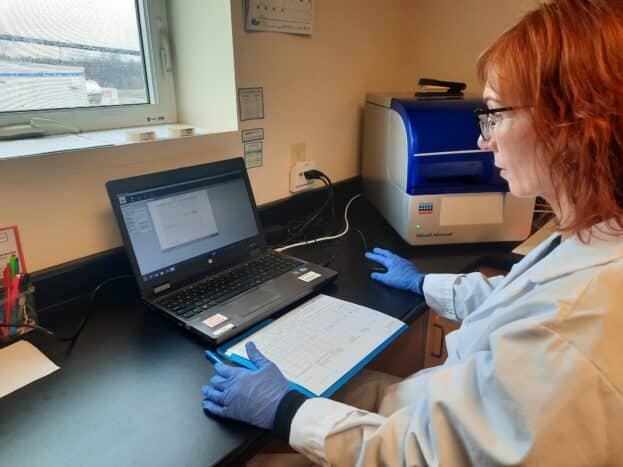
Sending samples to NDSU is “a little trickier. Whenever you’re sitting across the border you need to get proper permits to make sure that everything is accounted for and done properly, and is approved by the various governmental agencies,” Gibson says.
To send a sample to the NDSU lab it must have a United States Department of Agriculture (USDA) permit. It then must be inspected at the USDA Animal and Plant Health Inspection Service lab in New Jersey before being sent to NDSU for testing.
“When you’re trying to send tissue samples in a timely manner, and it’s got to be inspected on the Eastern Seaboard, it takes a lot of time — so it can compromise the samples,” Gibson says. Adding that while the lab is physically located only a few hours away from him, the regulatory process adds days and even weeks onto the transportation timeline.
The NDSU potato pathology lab, run by Julie Pasche, is a research not diagnostic lab, although there’s another located on campus which is a plant diagnostics lab. Pasche’s lab, which Gaia works with for fungicide resistance soil testing, provides testing for local growers in special instances. Gaia Consulting aren’t the only Canadians Pasche’s lab works with, they’ve also done research work with Vikram Bisht in Manitoba and Eugenia Banks in Ontario.
“We do not typically receive routine diagnostic samples from growers, but can provide a second opinion or conduct testing that is more specific or specialized including the identification of mutations responsible for fungicide resistance, among other things,” Pasche, NDSU associate professor and Neil C. Gudmestad endowed chair of potato pathology, says in a phone interview. “We are happy to support our colleagues to the north when feasible.”
While diagnostic testing services may not be geographically located close to everyone in the potato industry in Western Canada, those using these services feel they’re adequate. The Alberta potato industry is one of the main groups using Phyto Diagnostics services — both seed and commercial growers.
“For us here in Alberta, it’s very important to have access to the expertise. Peter being a private lab, he bends over backwards for the growers. He understands timelines, he understands the marketing demand. He works very closely with us with regards to our post-harvest testing programs and what we do in Hawaii… we rely on him a great deal,” Stacey Bajema, seed coordinator with Potato Growers of Alberta (PGA), explains in a phone interview.
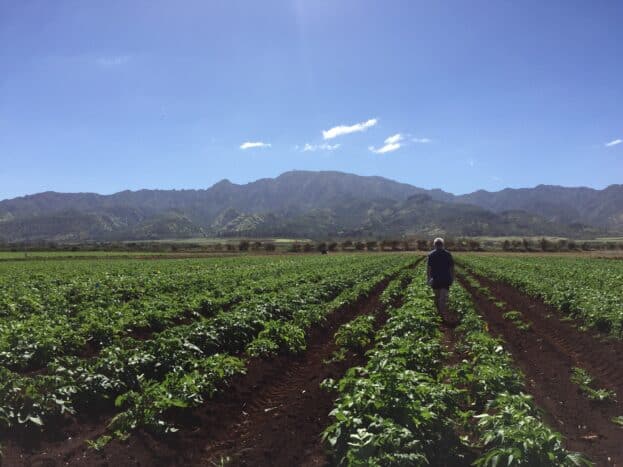
Alberta growers also use their provincial lab, the Alberta Plant Health Lab in Edmonton, Alta. which services the whole provincial agricultural industry. Bajema says provincially they’ve been working to boost their testing capacity with the Alberta Plant Health Lab and the University of Lethbridge. The PGA has been doing a research project to update diagnostic protocols for every known potato disease and expanding their culture collection of pathogens.
Despite Alberta having one of the largest potato industries in the country, running a potato only diagnostic lab in the province wouldn’t be feasible probably. Many private Canadian diagnostic labs don’t only service the potato industry but also other industries, such as Phyto Diagnostics which provides diagnostic tests for the fruit industry such as berry growers.
“If we can support private business that want to do more diagnostic testing, we will. But in the meantime, we’ve had tremendous support from the Alberta government and the growers have identified rapid diagnostics as a priority. Keeping our commercial and seed crops as clean as possible is always a priority,” Bajema says.
Despite local support for Canadian labs, some labs also receive business from the States. Phyto Diagnostics Services provides testing services to Washington State seed potato growers. During the winter, Phyto Diagnostics is involved in the seed trial grow outs in Hawaii for western Canadian and Washington State seed potato growers. Seed from western Canadian and Washington State seed potato lots are grown in Hawaii for quality assurance — Ellis and his team at Phyto Diagnostics provide the diagnostic testing for the samples.
“This year, we bought something like 65,000 leaves back from the Canadian samples. And we also had all of Washington State samples too. Washington State samples came in several days before we left to go down and get the Canadian ones. And they were all completed by the time we got back by the people in the lab,” Ellis explains, adding there was 65,000 leaves to test with results being sent out three days later.
The Future of Diagnostic Testing
With only a smattering of diagnostic labs across the country, it begs the question is there enough capacity in Canada? Most working in the industry agree that capacity-wise, the private diagnostic labs are fulfilling the needs of the Canadian potato industry.
“I think we have enough capacity as far as private labs and private testing is concerned. But as I said before, some of the testing provided on quarantine disease, I think we don’t have enough capacity there. And that’s why it takes so long for the growers to get the results,” Singh says.
In Alberta, the potato industry also has concerns about their being only one national laboratory in Charlottetown. Bajema says there’s worries about risk mitigation, what happens if something puts the Charlottetown lab out of commission, then how does the potato industry continue to operate testing services?
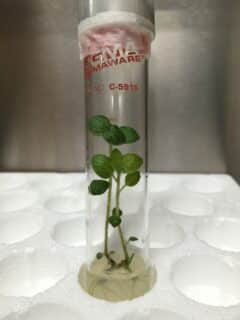
“We always talk as a grower group about the need for a second reference lab to service Western Canada. For Alberta, the biggest issue there is the time that it takes to get samples over there. So, in the case of a trace back or trace forward, which is an important part of seed certification. It can take up to 10 days to get through a trace forward just because of the time it takes to get samples from Alberta to the East Coast,” she explains.
The CFIA has processes in place for if something happens to the Charlottetown lab, William Anderson, the executive director for the CFIA’s Plant Health Science Directorate, explains in an emailed statement. He says the lab’s business continuity plan (BCP) has identified back-up laboratories within the CFIA and private labs under the CFIA Seed Potato Certification Program, that would be able to handle redirection of samples as required.
“The Charlottetown laboratory is also obligated under the ISO/IEC 17025 standard, (and our own BCP), to maintain back-up equipment and cross-trained technicians. The Charlottetown laboratory also has the ability to quickly convert lab spaces in response to test obligations or in the event of loss of containment, or specific infrastructure issues within lab spaces,” Anderson states in the email.
In 2020, the CFIA completed a review where it was decided they would carry on support for the continued centralization of testing and expertise. This allows for increased operational efficiency while minimizing maintenance, infrastructure, and administrative costs — meaning the CFIA isn’t considering opening a second potato lab in Canada.
“The annual cost to the Agency for shipping of potato samples is considered minimal in comparison to the cost of establishing a new laboratory, which could exceed $125 million for the facility and equipment alone,” Anderson says. “Beyond the financial aspect, the time required to cultivate expertise would also be a limiting factor. Due to the subjective nature of testing required, it can take several years to train employees to a level that ensures competency for confirmation of suspect pathogens.”
Anderson notes that since testing services were centralized in 2012, there have been no shipping issues or delays and all testing deadlines have been met. He added an alternate CFIA lab in Ontario is maintained to accept samples in the event of an emergency.
While there is only one national laboratory in Canada and five CFIA approved labs, a splattering of university and provincial labs across the country provide testing for services such as soil tests and disease diagnosis. While these labs may not be able to provide the required certification services, they’re able to provide tests for day-to-day potato growing.
Related Articles
Testing Potato Products for the Canadian Industry








